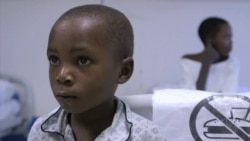LOS ANGELES —
The film Open Heart is about eight children with rheumatic heart disease who travel from Rwanda to Sudan for life-saving surgery. The short documentary is nominated for an Academy Award, and filmmaker Kief Davidson said he hopes it will spread awareness about a widespread health problem in Africa.
The film follows Rwandan cardiologist Emmanuel Rusingiza as he struggles to save young heart patients, some with just months to live.
“You know, sometimes when I go back home, I spend many hours and think about my patients who are not doing well,” said Rusingiza.
A journey to a hospital in Sudan, called the Salam Centre for Cardiac Surgery, offers hope to eight of those children, their heart valves damaged by acute rheumatic fever. The center is run by an Italian charity.
Davidson tells the story through the eyes of the youngsters and their families.
“I think anyone, particularly anyone who has kids, could only imagine what it must be like for those families,” he said.
The parents had to stay behind in Rwanda, not knowing if their children would survive or if they would ever see them again. Dr. Rusingiza led the children on their journey.
“This stay is going to be a bit long, in a country far from theirs. So it is hard,” he said.
These children suffer from rheumatic heart disease, caused by untreated strep throat that eventually damages heart valves. The problem was once common in the United States, but is now rare, said Davidson.
“And it is as simple as just having access to antibiotics to help solve the problem,” said Davidson.
He said the children's story is getting attention now that the film has been nominated for an Oscar.
“If this gets people talking, and it will, that is when change could happen,” said Davidson.
Rheumatic heart disease affects more than 15 million people worldwide. Health officials say that better distribution of antibiotics and diagnostic tools could save children in Africa and other parts of the developing world.
The film follows Rwandan cardiologist Emmanuel Rusingiza as he struggles to save young heart patients, some with just months to live.
“You know, sometimes when I go back home, I spend many hours and think about my patients who are not doing well,” said Rusingiza.
A journey to a hospital in Sudan, called the Salam Centre for Cardiac Surgery, offers hope to eight of those children, their heart valves damaged by acute rheumatic fever. The center is run by an Italian charity.
Davidson tells the story through the eyes of the youngsters and their families.
“I think anyone, particularly anyone who has kids, could only imagine what it must be like for those families,” he said.
The parents had to stay behind in Rwanda, not knowing if their children would survive or if they would ever see them again. Dr. Rusingiza led the children on their journey.
“This stay is going to be a bit long, in a country far from theirs. So it is hard,” he said.
These children suffer from rheumatic heart disease, caused by untreated strep throat that eventually damages heart valves. The problem was once common in the United States, but is now rare, said Davidson.
“And it is as simple as just having access to antibiotics to help solve the problem,” said Davidson.
He said the children's story is getting attention now that the film has been nominated for an Oscar.
“If this gets people talking, and it will, that is when change could happen,” said Davidson.
Rheumatic heart disease affects more than 15 million people worldwide. Health officials say that better distribution of antibiotics and diagnostic tools could save children in Africa and other parts of the developing world.








